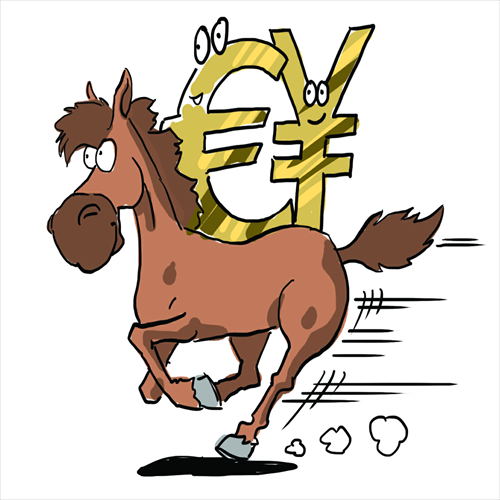Brussels and Beijing jointly seek sustainable and responsible growth

Illustration: Liu Rui/GT
In a couple of weeks we will enter the Year of the Horse. This will be a very important year, for both Europe and China, in particular in terms of the implementation of key policy decisions taken last year.
In the euro area, we will proceed to complete the banking union, an essential step to strengthen the economic recovery, and make further progress on our way to fiscal, economic and political union.
In China, policymakers will have to enact the far-reaching reforms decided at the Third Plenum of the 18th CPC Central Committee in November and the Central Economic Work Conference in December so as to put China on a sustainable, balanced and environmentally-friendly growth path.
While these are not easy tasks, we are confident that both Europe and China will overcome the difficulties in front of them, and make the Year of the Horse a year of growth and prosperity in which our bilateral economic relations will thrive.
A gradual recovery is now taking hold in the euro area. We expect that it will gather pace in 2014 because of the actions we have taken to strengthen the fundamentals of the European economy.
Action by the European Central Bank and the construction of a fully-fledged banking union will lead to a strong and stable European banking sector, breaking through the present fragmentation and decisively reducing risks to public finances.
We have strengthened our joint commitment to sound public finances, not only over the medium term, but also in the long term, as our population ages. Indeed, the average deficit in the euro area has been halved since 2010, and will fall further this year.
We have implemented far-reaching structural reforms, in particular in vulnerable countries, which have reduced internal imbalances and, over the medium term, will generate higher growth and employment.
The economic recovery in the euro area is important for China. The euro area is China's largest export market: Stronger growth in Europe will translate into higher demand for Chinese products and will support China's growth and employment. It also makes Europe more attractive to Chinese investors.
The EU favors the free movement of capital, which is one of its four fundamental freedoms, together with free movement of people, goods and services. The EU does not discriminate between domestic and foreign capital.
The EU is now the biggest investor in China, and European firms intend to strengthen their presence in such a key market. Chinese investors are welcome in Europe and we consider that Chinese investment can, in particular at this stage, deliver a win-win situation. It could contribute to the firming-up of the European recovery and to the creation of new jobs, and Chinese companies could benefit from being physically present in the largest integrated market in the world.
In addition, the EU is a highly sophisticated, environment-friendly and innovative market, which demands high-quality products. Since China intends to move rapidly upward on the technological ladder, a strong presence of Chinese investors in the European market could be an essential element for the success of such a strategy.
To ensure that EU investment to China and Chinese investment to the EU flow as seamlessly as possible, a strong institutional framework is needed. At the EU-China Summit held in Beijing in November 2013, the two sides agreed to "negotiate and conclude a comprehensive EU-China Investment Agreement that covers issues of interest to either side, including investment protection and market access." This was a welcome step forward in our bilateral economic relationship and we look forward to starting these negotiations as soon as possible.
The Year of the Horse will also be the year when, through the G20, the largest economies in the world will make a collective effort to put in place concrete growth strategies aimed at achieving strong, sustainable and balanced growth. Since the global financial crisis of 2008-09, growth has been disappointing both in quantitative and qualitative terms.
We need to do more to make it more sustainable and balanced. As the EU and China "share responsibility for ensuring that their economies remain key drivers for global economic growth and providing prosperity for all," as stated in the EU-China 2020 Strategic Agenda for Partnership agreed at the last EU-China Summit, they will be at the forefront of this effort. In this respect, the meetings that we will have in Beijing this week are also aimed at strengthening our dialogue and cooperation so as to ensure that China and the EU join to achieve a successful outcome of the G20 Summit in Brisbane in this November.
Olli Rehn is vice president of the European Commission, responsible for economic and monetary affairs and the euro. Jeroen Dijsselbloem is president of the Eurogroup. opinion@globaltimes.com.cn